英语常用短语的用法与练习(17)
现在分词短语的用法及例句
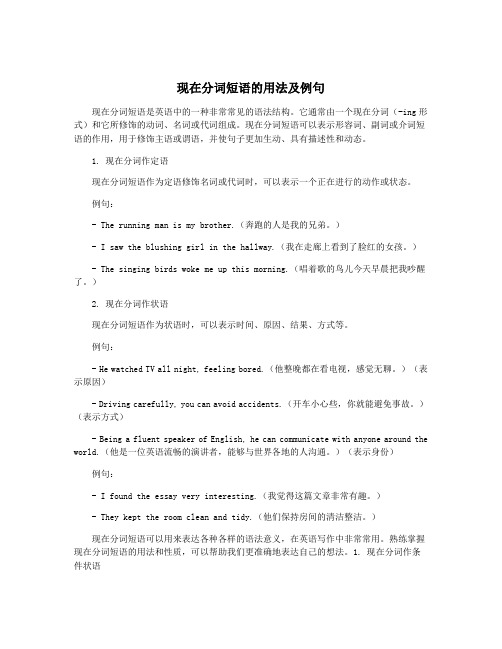
现在分词短语的用法及例句现在分词短语是英语中的一种非常常见的语法结构。
它通常由一个现在分词(-ing形式)和它所修饰的动词、名词或代词组成。
现在分词短语可以表示形容词、副词或介词短语的作用,用于修饰主语或谓语,并使句子更加生动、具有描述性和动态。
1. 现在分词作定语现在分词短语作为定语修饰名词或代词时,可以表示一个正在进行的动作或状态。
例句:- The running man is my brother.(奔跑的人是我的兄弟。
)- I saw the blushing girl in the hallway.(我在走廊上看到了脸红的女孩。
)- The singing birds woke me up this morning.(唱着歌的鸟儿今天早晨把我吵醒了。
)2. 现在分词作状语现在分词短语作为状语时,可以表示时间、原因、结果、方式等。
例句:- He watched TV all night, feeling bored.(他整晚都在看电视,感觉无聊。
)(表示原因)- Driving carefully, you can avoid accidents.(开车小心些,你就能避免事故。
)(表示方式)- Being a fluent speaker of English, he can communicate with anyone around the world.(他是一位英语流畅的演讲者,能够与世界各地的人沟通。
)(表示身份)例句:- I found the essay very interesting.(我觉得这篇文章非常有趣。
)- They kept the room clean and tidy.(他们保持房间的清洁整洁。
)现在分词短语可以用来表达各种各样的语法意义,在英语写作中非常常用。
熟练掌握现在分词短语的用法和性质,可以帮助我们更准确地表达自己的想法。
1. 现在分词作条件状语当现在分词短语与 if 或 when 连用时,可以表示一个条件或情况。
初中重要英语短语用法汇总
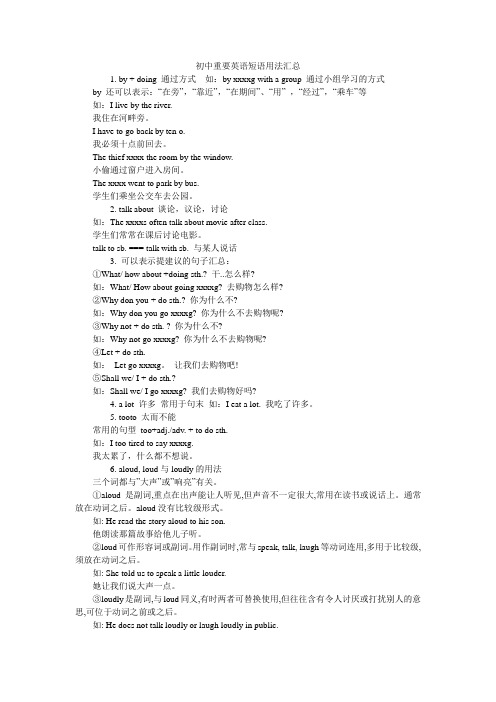
初中重要英语短语用法汇总1. by + doing 通过方式如:by xxxxg with a group 通过小组学习的方式by 还可以表示:“在旁”,“靠近”,“在期间”、“用” ,“经过”,“乘车”等如:I live by the river.我住在河畔旁。
I have to go back by ten o.我必须十点前回去。
The thief xxxx the room by the window.小偷通过窗户进入房间。
The xxxx went to park by bus.学生们乘坐公交车去公园。
2. talk about 谈论,议论,讨论如:The xxxxs often talk about movie after class.学生们常常在课后讨论电影。
talk to sb. === talk with sb. 与某人说话3. 可以表示提建议的句子汇总:①What/ how about +doing sth.? 干..怎么样?如:What/ How about going xxxxg? 去购物怎么样?②Why don you + do sth.? 你为什么不?如:Why don you go xxxxg? 你为什么不去购物呢?③Why not + do sth. ? 你为什么不?如:Why not go xxxxg? 你为什么不去购物呢?④Let + do sth.如:Let go xxxxg。
让我们去购物吧!⑤Shall we/ I + do sth.?如:Shall we/ I go xxxxg? 我们去购物好吗?4. a lot 许多常用于句末如:I eat a lot. 我吃了许多。
5. tooto 太而不能常用的句型too+adj./adv. + to do sth.如:I too tired to say xxxxg.我太累了,什么都不想说。
6. aloud, loud与loudly的用法三个词都与”大声”或”响亮”有关。
初中英语知识点归纳常见的动词和动词短语
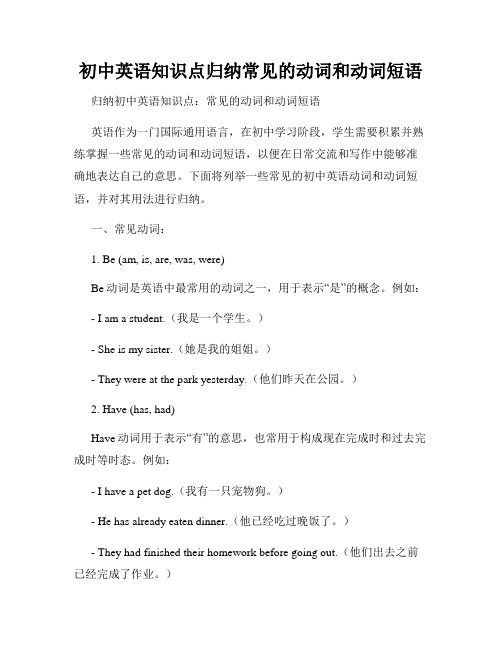
初中英语知识点归纳常见的动词和动词短语归纳初中英语知识点:常见的动词和动词短语英语作为一门国际通用语言,在初中学习阶段,学生需要积累并熟练掌握一些常见的动词和动词短语,以便在日常交流和写作中能够准确地表达自己的意思。
下面将列举一些常见的初中英语动词和动词短语,并对其用法进行归纳。
一、常见动词:1. Be (am, is, are, was, were)Be动词是英语中最常用的动词之一,用于表示“是”的概念。
例如:- I am a student.(我是一个学生。
)- She is my sister.(她是我的姐姐。
)- They were at the park yesterday.(他们昨天在公园。
)2. Have (has, had)Have动词用于表示“有”的意思,也常用于构成现在完成时和过去完成时等时态。
例如:- I have a pet dog.(我有一只宠物狗。
)- He has already eaten dinner.(他已经吃过晚饭了。
)- They had finished their homework before going out.(他们出去之前已经完成了作业。
)3. Do (does, did)Do动词常用于构成否定句、疑问句和一般疑问句等句子结构中。
例如:- I don't like coffee.(我不喜欢咖啡。
)- Does she play the piano?(她会弹钢琴吗?)- Did you go to the park yesterday?(你昨天去了公园吗?)4. Go (goes, went, gone)Go动词表示“去”的动作,也常用于构成进行时态和完成时态等句子。
例如:- I go to school by bus.(我坐公交车去上学。
)- She often goes swimming on weekends.(她经常在周末去游泳。
高中英语常用单词词组的用法和例句
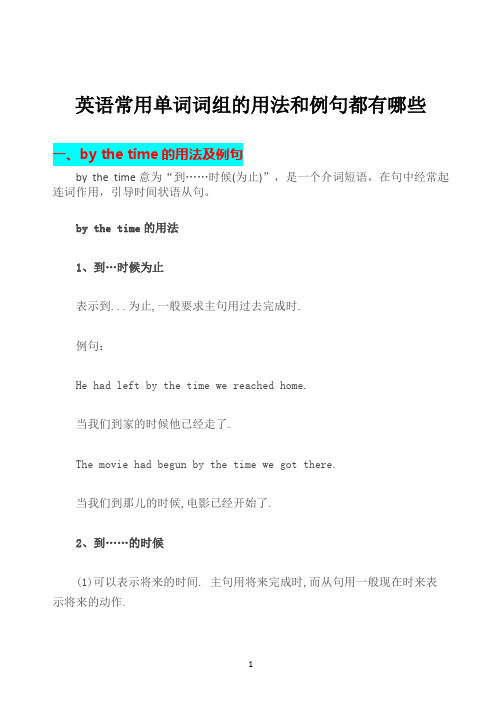
英语常用单词词组的用法和例句都有哪些一、by the time的用法及例句by the time意为“到……时候(为止)”,是一个介词短语,在句中经常起连词作用,引导时间状语从句。
by the time的用法1、到…时候为止表示到...为止,一般要求主句用过去完成时.例句:He had left by the time we reached home.当我们到家的时候他已经走了.The movie had begun by the time we got there.当我们到那儿的时候,电影已经开始了.2、到……的时候(1)可以表示将来的时间. 主句用将来完成时,而从句用一般现在时来表示将来的动作.I will have finished the work by the time my father comes back.(2)可以表示过去的时间. 主句用过去完成时,而从句用一般过去时.He had built a lab for himself by the time he was 12 years old.注:如果只是说过去某个时候的状况,用过去时,而不用完成时。
例句: By the time the war was over , death and suffering were to be seen everywhere.在战争结束的时候,到处可见死亡和饥饿。
这里没有“死亡和饥饿”已经完成的意思,只是描述当时这个时间点的状况。
所以用过去时。
二、beneficial的用法搭配及例句beneficial:形容词,意为有益的;有利的;有帮助的,侧重对健康、身心或事业有益。
beneficial后面通常加for 或to,构成搭配be beneficial for和be beneficial to。
1 beneficial的用法英[benɪ'fɪʃ(ə)l] 美[,bɛnɪ'fɪʃl]adj. 有益的,有利的;可享利益的例句:1、I have mentioned a number of times the beneficial effects of music playedto the unborn child.我已数次谈及给未出生孩子播放音乐的益处。
do的用法和搭配短语
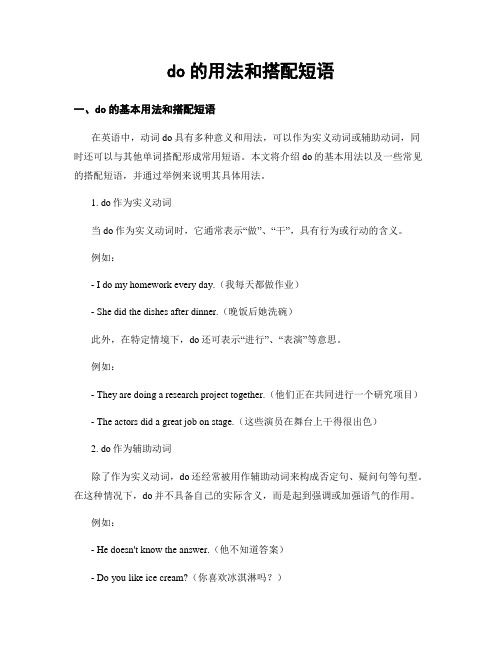
do的用法和搭配短语一、do的基本用法和搭配短语在英语中,动词do具有多种意义和用法,可以作为实义动词或辅助动词,同时还可以与其他单词搭配形成常用短语。
本文将介绍do的基本用法以及一些常见的搭配短语,并通过举例来说明其具体用法。
1. do作为实义动词当do作为实义动词时,它通常表示“做”、“干”,具有行为或行动的含义。
例如:- I do my homework every day.(我每天都做作业)- She did the dishes after dinner.(晚饭后她洗碗)此外,在特定情境下,do还可表示“进行”、“表演”等意思。
例如:- They are doing a research project together.(他们正在共同进行一个研究项目)- The actors did a great job on stage.(这些演员在舞台上干得很出色)2. do作为辅助动词除了作为实义动词,do还经常被用作辅助动词来构成否定句、疑问句等句型。
在这种情况下,do并不具备自己的实际含义,而是起到强调或加强语气的作用。
例如:- He doesn't know the answer.(他不知道答案)- Do you like ice cream?(你喜欢冰淇淋吗?)3. do的常见搭配短语do作为一个常见的动词,可以与其他单词或短语搭配使用,形成一些固定用法和习惯说法。
以下列举了一些常见的搭配短语:(1) do business:从事生意- He has been doing business in China for years.(他在中国做生意已经很多年了)(2) do favor:帮忙- Can you do me a favor and pick up my dry cleaning?(你能帮我一个忙去拿我的干洗吗?)(3) do harm:造成伤害- Smoking does harm to your health.(吸烟对身体有害)(4) do well:表现良好- She did well on her exam and got an A.(她考试考得很好,得了一个A)(5) do laundry:洗衣服- I need to do some laundry this weekend.(这个周末我需要洗点衣服)(6) do research:进行研究- He is doing research on new cancer treatments.(他正在进行新的癌症治疗方法的研究)二、do在不同场景中的具体用法除了以上介绍的基本用法和常见搭配短语,do在不同场景中还有一些特定的用法。
common的用法和短语
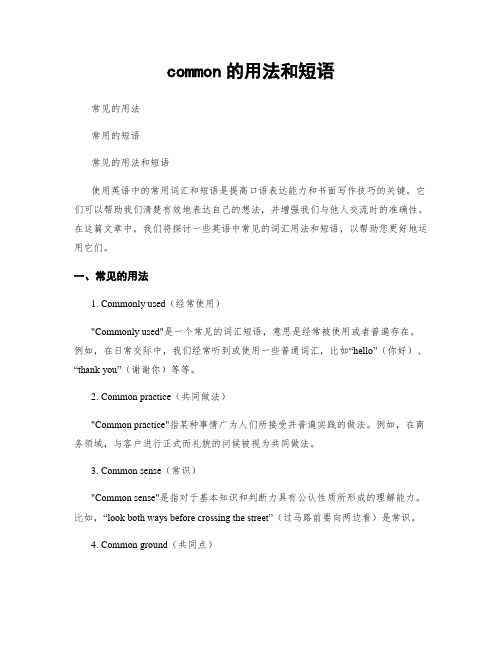
common的用法和短语常见的用法常用的短语常见的用法和短语使用英语中的常用词汇和短语是提高口语表达能力和书面写作技巧的关键。
它们可以帮助我们清楚有效地表达自己的想法,并增强我们与他人交流时的准确性。
在这篇文章中,我们将探讨一些英语中常见的词汇用法和短语,以帮助您更好地运用它们。
一、常见的用法1. Commonly used(经常使用)"Commonly used"是一个常见的词汇短语,意思是经常被使用或者普遍存在。
例如,在日常交际中,我们经常听到或使用一些普通词汇,比如“hello”(你好)、“thank you”(谢谢你)等等。
2. Common practice(共同做法)"Common practice"指某种事情广为人们所接受并普遍实践的做法。
例如,在商务领域,与客户进行正式而礼貌的问候被视为共同做法。
3. Common sense(常识)"Common sense"是指对于基本知识和判断力具有公认性质所形成的理解能力。
比如,“look both ways before crossing the street”(过马路前要向两边看)是常识。
4. Common ground(共同点)"Common ground"意指人们在某些观点上或兴趣上有共鸣和一致的地方。
例如,在职场中,找到共同点并与同事建立良好关系是非常重要的。
5. Common goal(共同目标)"Common goal"强调不同个体为了同一个目标而努力合作。
比如,在团队项目中,所有成员都会为实现共同的目标而努力工作。
二、常用的短语1. In common(共通)"In common"表示两个或多个对象之间具有相似之处或者特性。
例如,“Both Alice and Bob have a love of music in common”(爱丽丝和鲍勃都对音乐有共同的爱好)。
英语常用短语的用法与练习
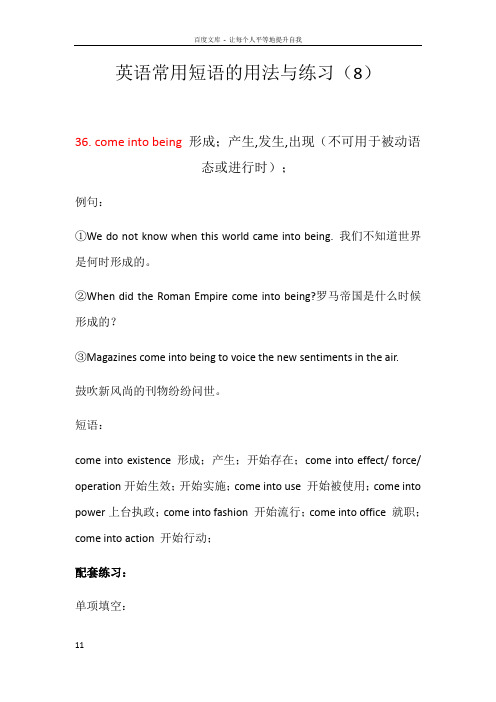
英语常用短语的用法与练习(8)36. come into being 形成;产生,发生,出现(不可用于被动语态或进行时);例句:①We do not know when this world came into being. 我们不知道世界是何时形成的。
②When did the Roman Empire come into being?罗马帝国是什么时候形成的?③Magazines come into being to voice the new sentiments in the air.鼓吹新风尚的刊物纷纷问世。
短语:come into existence 形成;产生;开始存在;come into effect/ force/ operation开始生效;开始实施;come into use 开始被使用;come into power上台执政;come into fashion 开始流行;come into office 就职;come into action 开始行动;配套练习:单项填空:①Before the computer ____ , people could never imagine it could bring about such great changes to human life.A. came into beingB. was discoveredC. was come into beingD. was formed②Once a bad man comes into _____, the people of that country will suffer a lot.A. energyB. officeC. powerD. nation③It is said that this old building has _____ for more than three hundred years.A.existedB.appearedC.been builte into being④Do you know when did the world _____?A. come into beingB. comeC. formedD. existed37. come to life 复活;苏醒;变得活跃;恢复生气;例句:①I love to watch everything come to life in spring. 我喜欢看到春天万象更新。
高一(17)it的用法讲解、练习+七选五+完形填空+短文改错

高一(17)i t的用法讲解、练习+七选五+完形填空+短文改错-CAL-FENGHAI-(2020YEAR-YICAI)_JINGBIAN高一英语暑期复习材料(17)词汇巩固A New Farming Way 新的耕种方式Tuan was a farmer in Vietnam. For (decade), he had been (努力做)rid his family of hunger. However, it always (使……困惑) him how to expand the output of his crop s. This (disturb)problem (导致) his (regret) being a farmer. He (宁愿) have chosen another job.One day, when skim ming through a newspaper, Tuan read a comment on Yuan Longpin. He underline d Yuan’s nationality and occupation, and then (集中注意力) his discovery and the statistic s of his research. He found the knowledge Yuan circulate d very practical.(因此), he made a summary and began to (建立) a new farming method. He planted super grain of rich nutrition and (装备;配备) himself to keep his crops root s free from bacteria and pest s. He also enriched mineral s in the soil while_______________(reduce) chemical fertilizer s. Though it cost him more time and (free), he was full of hope.The next year, Tuan was sunburnt but (对……满意) his production very much.________________ (幸亏) Yuan Longpin, he not only won the battle against hunger, but he could also ___________(出口)his crops abroad.It的用法一、人称代词1,it的最基本用法是作代词,主要指刚提到的事物,以避免重复:①They watched the train until it disappeared in the distance.2.,也可以指动物或婴儿(未知性别的婴儿或孩子):②Is this your dog?No, it isn’t.③They got a baby and it was a ten-pounder3.,也可指抽象事物或指抽象环境和情景:③I hate it when people talk with a full mouth..二、.非人称代词1.it有时并不指具体的东西而泛指天气、时间、日期、距离、价值、度量、温度、环境等:⑴.指天气:It is a lovely day, isn’t it⑵.指时间: It was nearly midnight when she came back.⑶.指日期:It is April First today.⑷.指距离:It is some 3000 kilometers from Beijing to Guangzhou.⑸.指价值:It is three dollars.⑹.指温度:Today it is 30 degrees centigrade.三、其他用法1.在句子的主语不太明确时充当主语,表示谁在做某事:①Who is it thereIt's I (me/you/he.....).②I thought it was Mary, but it was not she.③Her face lighted when she saw who it was.2.泛泛的指某件事: (有时泛指一般情况)①It doesn’t matter.②It is a shame, isn’t it?③How is it going(情况怎样)④It says in the newspaper that......3.it用在一些词组中,it 没有特别的意思The last train's gone. Come on, we'll foot it.(来,咱们步行吧。
英语常用短语的用法与练习(3)
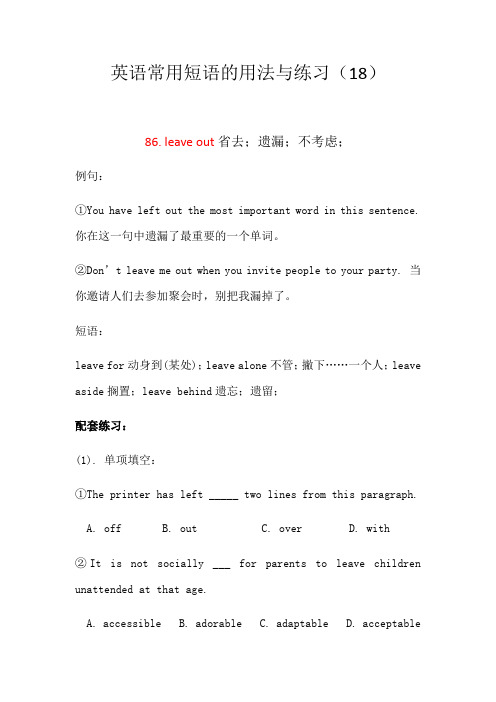
英语常用短语的用法与练习(18)86. leave out省去;遗漏;不考虑;例句:①You have left out the most important word in this sentence. 你在这一句中遗漏了最重要的一个单词。
②Don’t leave me out when you invite people to your party.当你邀请人们去参加聚会时,别把我漏掉了。
短语:leave for动身到(某处);leave alone不管;撇下……一个人;leave aside搁置;leave behind遗忘;遗留;配套练习:(1). 单项填空:①The printer has left _____ two lines from this paragraph.A. offB. outC. overD. with②It is not socially ___ for parents to leave children unattended at that age.A. accessibleB. adorableC. adaptableD. acceptable③I’ll be glad for you to leave me alone. I surely will. It’s none of my ___.A. affairsB. businessC. matterD. events④It’s better to call the children inside, it’s cold. Just ___. They are all enjoying themselves.A.leave them there where they areB. let them aloneC. leave them lonelyD. left them where they are(2). 用适当的介词或副词填空:①They were left _____ in the wilderness.②He was asked to make up the information left _____ by the leader.87. let out发出;放走;泄露例句:①Every time she moved her leg, she let out a moan. 每次她动一下腿,就会发出一声呻吟。
practise的短语和例句
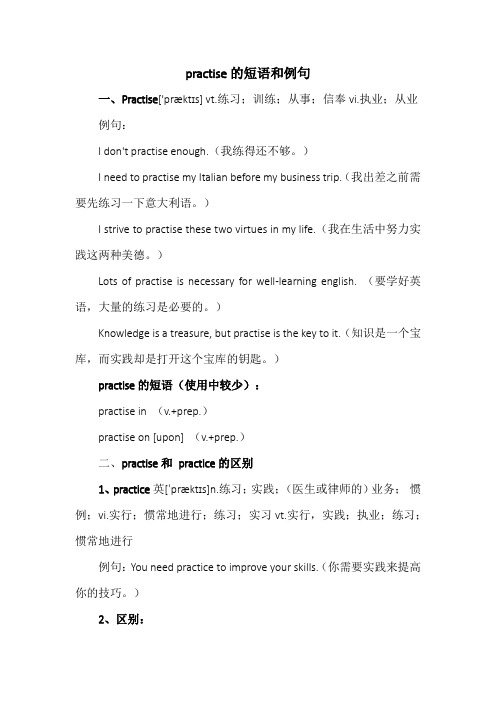
practise的短语和例句一、Practise['præktɪs] vt.练习;训练;从事;信奉vi.执业;从业例句:I don't practise enough.(我练得还不够。
)I need to practise my Italian before my business trip.(我出差之前需要先练习一下意大利语。
)I strive to practise these two virtues in my life.(我在生活中努力实践这两种美德。
)Lots of practise is necessary for well-learning english. (要学好英语,大量的练习是必要的。
)Knowledge is a treasure, but practise is the key to it.(知识是一个宝库,而实践却是打开这个宝库的钥匙。
)practise的短语(使用中较少):practise in (v.+prep.)practise on [upon] (v.+prep.)二、practise和practice的区别1、practice英[ˈpræktɪs]n.练习;实践;(医生或律师的)业务;惯例;vi.实行;惯常地进行;练习;实习vt.实行,实践;执业;练习;惯常地进行例句:You need practice to improve your skills.(你需要实践来提高你的技巧。
)2、区别:(1)practice有两种词性,一种是名词(.n),一种是动词(.v),都是“练习”的意思。
(2)practise只有动词词性,用法和意思与practice相同,所以一般情况下用practice代替practise。
三、practice 的常用短语(用作名词):1、in practice在实践中例句:It's important to keep in practice.(经常练习很重要。
英语常用短语的用法与练习(4)
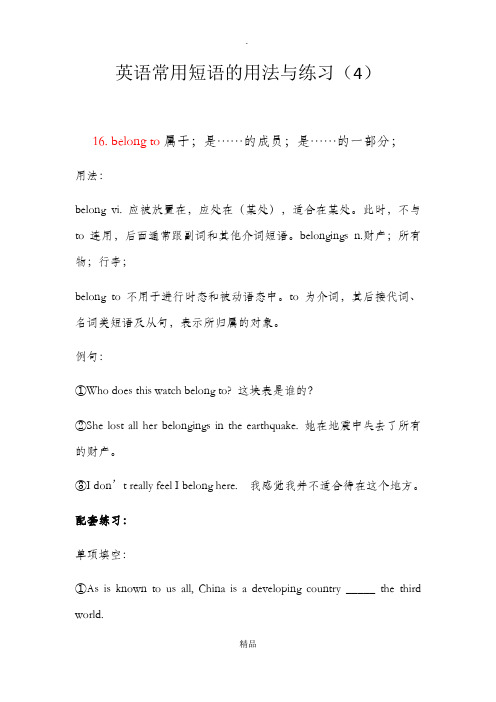
英语常用短语的用法与练习(4)16. belong to属于;是……的成员;是……的一部分;用法:belong vi. 应被放置在,应处在(某处),适合在某处。
此时,不与to连用,后面通常跟副词和其他介词短语。
belongings n.财产;所有物;行李;belong to不用于进行时态和被动语态中。
to 为介词,其后接代词、名词类短语及从句,表示所归属的对象。
例句:①Who does this watch belong to? 这块表是谁的?②She lost all her belongings in the earthquake. 她在地震中失去了所有的财产。
③I don’t really feel I belong here. 我感觉我并不适合待在这个地方。
配套练习:单项填空:①As is known to us all, China is a developing country _____ the third world.A. belongingB. belongedC. belonging toD. belonged to②The railways in China belong to ______, whereas the ones in Japan, to the private..A. the nationB. the countryC. the stateD. the land③Which of the following groups doesn’t belong to the same category?A. cows, bulls, oxenB. lamb, sheep, goatsC. dog, ram, houndD. hen, cock, chick④There are four basic _____ of blood in the human body. What do you belong to, A, B, AB or O?A. kindsB. sortsC. typesD. classes⑤Christopher Marlore (1564—95) was a writer belonging to ______of Shakespeare.A. the periodB. a timeC. an ageD. day17. block out 挡住(光线);标示街区;写出…提纲例句:①That wall blocks out all the light. 那堵墙把光线都遮住了。
英语常用短语的用法与练习

英语常用短语的用法与练习Document number【980KGB-6898YT-769T8CB-246UT-18GG08】英语常用短语的用法与练习(14)66. get away with被放过;(做坏事)不受惩罚;例句:①If you cheat in the exam, you’ll never get away with it.考试作弊必予追究。
②I won’t have you getting away with cheating in the exam. 我不能容忍你考试作弊而不受惩罚。
③He’s not very good at getting his ideas across.他不太善于清楚地表达自己的思想。
④We should get rid of the bad style and keep the good. 我们应该摒弃不良作风,保持优良作风。
短语:get across=put across (使)被理解;(把……)讲清楚;get rid of 摆脱;除掉;get away (from) (从)……脱离,逃脱……;get down to (doing)sth. 开始认真地做某事;get in 插话;收获;get in touch with 与……取得联系;get into the habit of... 染上……的习惯;get into trouble 陷入困境;get out (of ...) 出去,离开,逃脱,摆脱;get hold of 抓住;geton/along well with...与……相处得好;进展顺利(多用进行时);get over 爬过……;克服(困难);从……中恢复过来;get through 完成;花光(时间、金钱等);通过;接通电话;配套练习:(1). 单项填空:①His mother had thought is would be good for his character to_____from home and earn some money on his own.A. run away B take away C.keep away D.get away②As soon as he got to the office, he______ the students’ papers.A. got down to correctB. got down to correctingC. set down to correctingD. sit down to correcting③The final examination is coming up soon. It's time for us to ____ our studies.A. get down toB. get outC. get back forD. get over④The final examination is coming up soon. It’s time for us to _____ our studies.A. get down toB. get outC. get back forD. get over(2). 完成句子:①To my surprise, the baby wolf _______ (与……相处得不错) the dogs and then managed to survive.②She never arrives on time at the office, but she somehow managed to ______ (侥幸逃脱) it.③Well, stop chatting. It’s time we _______ (开始,着手) some serious work.④The news was a terrible blow to her, but she will ______ (从……恢复过来) the shock soon.67. get into陷入;染上(坏习惯);例句:①I’m really getting into jazz these days.近来我喜欢上爵士乐了。
大学英语语法与练习——unit17IT的用法及系动词
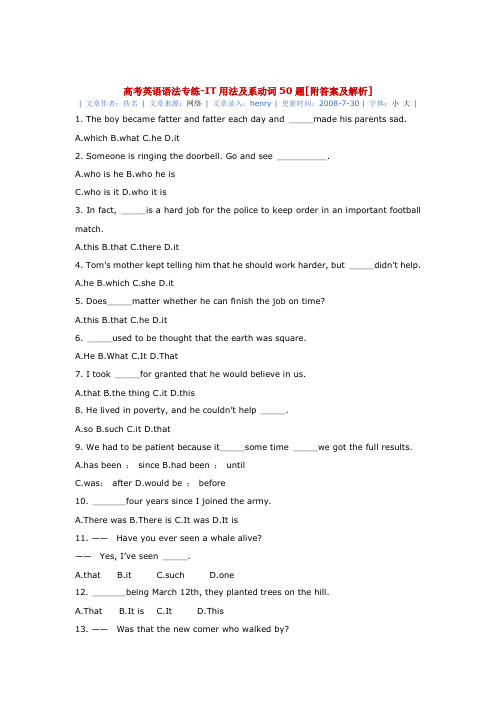
高考英语语法专练-IT用法及系动词50题[附答案及解析]| 文章作者:佚名| 文章来源:网络| 文章录入:henry | 更新时间:2008-7-30 | 字体:小大|1. The boy becam e fatter and fatter each day and ___m ade his parents sad.A.whichB.whatC.heD.it2. Som eone is ringing the doorbell. Go and see ______.A.who is heB.who he isC.who is itD.who it is3. In fact, ___is a hard job for the police to keep order in an important football match.A.thisB.thatC.thereD.it4. Tom’s mother kept telling him that he should work harder, but ___didn’t help.A.heB.whichC.sheD.it5. Does___matter whether he can finish the job on tim e?A.thisB.thatC.heD.it6. ___used to be thought that the earth was square.A.HeB.WhatC.ItD.That7. I took ___for granted that he would believe in us.A.thatB.the thingC.itD.this8. He lived in poverty, and he couldn’t help ___.A.soB.suchC.itD.that9. We had to be patient because it___som e time ___we got the full results.A.has been ;sinceB.had been ;untilC.was;afterD.would be ;before10. ____four years since I joined the arm y.A.There wasB.There isC.It wasD.It is11. ——Have you ever seen a whale alive?——Yes, I’ve seen ___.A.thatB.itC.suchD.one12. ____being March 12th, they planted trees on the hill.A.ThatB.It isC.ItD.This13. ——Was that the new com er who walked by?——_____.A.It m ust be thatB.It m ust have beenC.He must beD.This must have been14. Our classroom is very clean. Do you know who___cleaned it?A.was it thatB.it was thatC.was it whoD.he was15. It’s the third time _____arrived late this m onth.A.that youB.when youC.that you’veD.when you’ve16. He said, “_____a long way to school. _____a long way to go yet before we arrived.”A.It is ;There isB.There is ;It isC.It is ;It isD.There is;There is17. ______for the free tickets, I would not have gone to the film s so often.A.If it is notB.Where it notC.Had it not beenD.If they were not18. She finds ______boring ______at hom e.A.it;stayingB.that;being stayedC.this;to stayD.it;stayed19. —— Few children are as bright as he is, and also, he works very hard. ——It’s no _____that he always gets the first place in any examination.A.questionB.doubtC.problemD.wonder20. Now then, children. It’s high time you ______and dressed.A.washedB.should washC.were washedD.are washed21. —— Why did he let you repeat his instruction tim e and time again?——______that I remember what was_____after he went out.A.To see to it;to be doneB.Making sure;to be doneC.To m ake sure;to doD.Seeing to;done22. ___the people have becom e the master of their own country___science can really serve the people.A.It is only then;thatB.It was that;whenC.It is only when;thatD.It was when;then23. _____is no difference between A and B.A.ThereB.WhereC.ItD.What24. How long _____to finish your composition?A.will it take youB.will take youC.you will take itD.you will take25. _____is just like him to want to do som ething different from everybody else.A.ItB.ThereC.HeD.Who26. That young Swedish_____quite still, except that his lips moved slightly.A.keptB.grewC.gotD.stood27. In late autum n leaves _____brown.A.getB.turnC.stand e28. Little Jim’s speech sounds _____.A.friendlyB.wonderfullyC.pleasantlyD.nicely29. The poor boy _____blind at the age of three.A.turnedB.wentC.becam eD.looked30. As a child, Franc _____.A.was aliveB.grew patienceC.ran wildD.cam e true31. In spring, all the flowers in the garden _____sweet.A.becom eB.tasteC.sm ellD.sound32. She _____like her mother in character.A.feelsB.seemsC.looksD.is33. It _____another fine day tom orrow.A.seem sB.appearsC.promisesD.looks34. His father _____that older than he really is.A.growsB.appearsC.turnsD.becom es35. His girlfriend _____a singer.A.has turnedB.grewC.has becom eD.turned36. Obviou sly, the old soldier’s knowledge of English___very weak.A.seem sB.risedC.rem ainedD.looked37. His mother _____teacher.A.becam eB.has turnedC.cam eD.proved38. It sounds _____the singing of rails.A.asB.inC.likeD.as if39. Her tem perature ______to be all right.A.seem sB.soundsC.appearsD.looks40. His wish to becom e a driver has _____true.A.realized eC.grownD.turned41. His plan _____to be a perfect one.A.provedB.was provedC.is provingD.proving42. When her mother cam e home yesterday, it was___dark.A.runningingC.gettingD.going43. These apples taste _____.A.to be goodB.goodC.to be wellD.well44. —— How about the cloth you bought yesterday?——That’s very beautiful. It ______so soft.A.feltB.feelsC.is feelingD.fall45. When his brother telephoned him last night, he_____asleep.A.keptB.gotC.fallD.fell46. He looks____he hadn’t had a good meal for a month.A.thatB.as ifC.whenD.so far47. It _____that he was late for the train.A.loosB.turnsC.getsD.seem s48. What does your brother look _____?A.asB.onC.afterD.like49. She _______red with anger as soon as she heard the news.A.wentB.stayedC.becam eD.remained50. What a lovely day! I hope it _____fine.A.stayedB.will stayC.will getD.turn参考答案及解析1.D。
高考英语常用动词短语
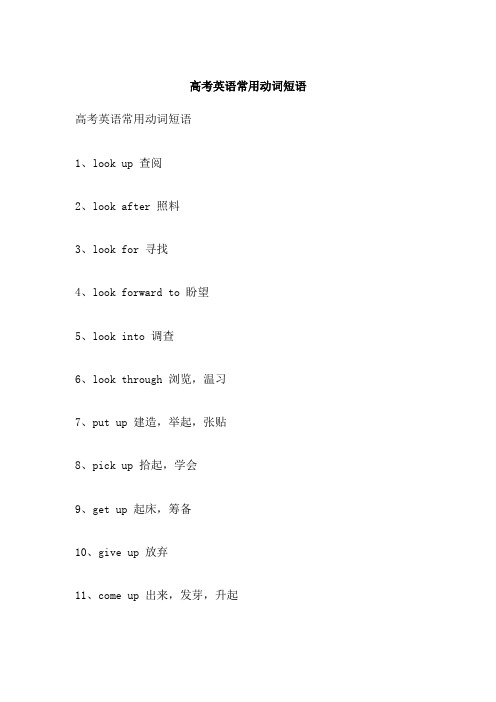
高考英语常用动词短语高考英语常用动词短语1、look up 查阅2、look after 照料3、look for 寻找4、look forward to 盼望5、look into 调查6、look through 浏览,温习7、put up 建造,举起,张贴8、pick up 拾起,学会9、get up 起床,筹备10、give up 放弃11、come up 出来,发芽,升起12、catch up 赶上13、keep up 保持14、hold up 举起,阻挡15、cut up 切碎16、call up打电话,使…想起17、set up 建立,开业18、sit up 熬夜,坐直19、come down 下来,崩溃,失败20、come along 随同21、come on 赶快,上演,出台,播放22、come in 进来,上市,得到批准23、come out 出来,出版,结果是24、come from 来自,出生在,由……制成25、go on 继续,播放,举办,播放26、go out 出去,熄灭27、go over 检查,复习28、go ahead 干吧,进展,用吧29、go through 通过,审查,完成30、go up 上涨,建造起31、go along with 附和,支持32、fill up 填满33、get on 上车,穿上,上演,举办,播放34、get down 下来,落下,记下,拿下,播放学而时习之高中英语常用短语动词高中英语常用短语动词是指在英语语法中常用的一些动词短语,它们在日常交流和学习中非常常见。
掌握这些短语动词对于提高英语口语和写作能力非常重要。
在高中英语中,一些常用的短语动词包括:1、"get" 短语动词"get" 是一个非常常用的动词,后面加上不同的介词可以构成很多短语动词。
例如:1、get up:起床2、get dressed:穿衣服3、get down:下车4、get along:相处5、get through:完成2、"put" 短语动词"put" 也是一个常用的动词,加上不同的介词可以构成很多短语动词。
初中英语常用的介词短语
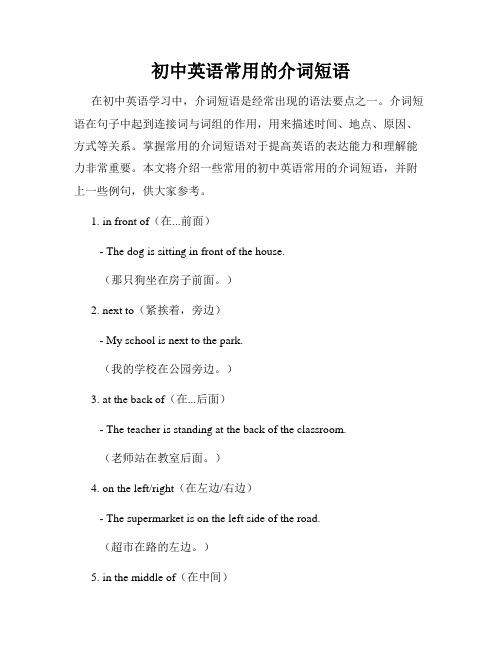
初中英语常用的介词短语在初中英语学习中,介词短语是经常出现的语法要点之一。
介词短语在句子中起到连接词与词组的作用,用来描述时间、地点、原因、方式等关系。
掌握常用的介词短语对于提高英语的表达能力和理解能力非常重要。
本文将介绍一些常用的初中英语常用的介词短语,并附上一些例句,供大家参考。
1. in front of(在...前面)- The dog is sitting in front of the house.(那只狗坐在房子前面。
)2. next to(紧挨着,旁边)- My school is next to the park.(我的学校在公园旁边。
)3. at the back of(在...后面)- The teacher is standing at the back of the classroom.(老师站在教室后面。
)4. on the left/right(在左边/右边)- The supermarket is on the left side of the road.(超市在路的左边。
)5. in the middle of(在中间)- The cat is sleeping in the middle of the bed.(猫正在床的中间睡觉。
)6. between...and...(在...和...之间)- The library is between the school and the post office.(图书馆在学校和邮局之间。
)7. at the corner of(在...的拐角处)- The bakery is at the corner of the street.(面包店在街的拐角处。
)8. near(在附近)- There is a park near my house.(我家附近有一个公园。
)9. across from(在...的对面)- The hospital is across from the supermarket.(医院在超市的对面。
英语常用短语的用法与练习(15)

英语常用短语的用法与练习(15)71. give in 屈服,让步,投降;上交;用法:give in 意思是“屈服,投降”,不及物动词give in to 意思是“屈服于”,及物动词,两者的区别是由于他们的词性而定的,因为give in 本身是一个不及物动词短语,后面不可以加名词或代词。
因此假如要加上名词或代词,必须在其后面带上to,转变成一个及物动词短语。
例句:①Seeing that he could not persuade me, he had to give in (to my view). 由于无法说服我,他不得不让步。
②Our food supply at last gives out.我们的食物终于用完了。
③His strength gave out.他已筋疲力尽。
④You must give in your examination papers now. 你们现在必须把你们的试卷交上来。
give短语:give in (to sb./sth.) 向……让步;give up sth./doing 放弃(做)某事;give away 赠送;泄露;give back 归还;恢复;give off 放出,散发(光、热、烟、气味等);give out分配;分发;发布;(食物,燃料,电力等)被用光;筋疲力尽;配套练习:单项填空①It is always the husband who ____ first when a quarrel breaks out between the young couple.A. give awayB. gives outC. gives inD. gives off②He has failed several times, but he won’t _____.A. go onB. come onC. get upD. give up③More and more people are willing to______part of their incomes to the school children in the poverty areas.A.give inB.give awayC.give outD.give up④Rod loves ____ clocks. However, he never manages to put them together again.A. taking apartB. giving awayC. making upD. turning off⑤She tried hard to keep calm in face of the students, but the sweat on her forehead _____ her ____.A. gave; awayB. tuned; downC. showed; outD. shut; off⑥Nobody noticed the thief slip into the house because the lights happened to ___.A. be put upB. give inC. be turned onD. go out72. go ahead执行;进行,前进;(用于祈使句)可以;往下说;用吧;开始吧;例句:①Despite the bad weather, the journey will go ahead.尽管天气不好,旅行将照常进行。
on way 用法
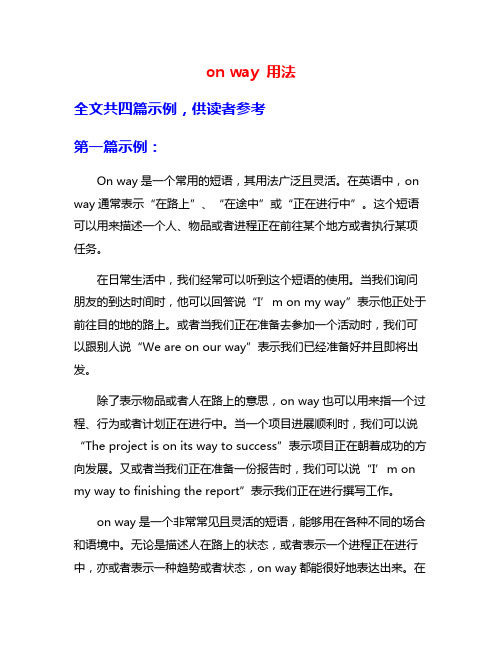
on way 用法全文共四篇示例,供读者参考第一篇示例:On way是一个常用的短语,其用法广泛且灵活。
在英语中,on way通常表示“在路上”、“在途中”或“正在进行中”。
这个短语可以用来描述一个人、物品或者进程正在前往某个地方或者执行某项任务。
在日常生活中,我们经常可以听到这个短语的使用。
当我们询问朋友的到达时间时,他可以回答说“I’m on my way”表示他正处于前往目的地的路上。
或者当我们正在准备去参加一个活动时,我们可以跟别人说“We are on our way”表示我们已经准备好并且即将出发。
除了表示物品或者人在路上的意思,on way也可以用来指一个过程、行为或者计划正在进行中。
当一个项目进展顺利时,我们可以说“The project is on its way to success”表示项目正在朝着成功的方向发展。
又或者当我们正在准备一份报告时,我们可以说“I’m on my way to finishing the report”表示我们正在进行撰写工作。
on way是一个非常常见且灵活的短语,能够用在各种不同的场合和语境中。
无论是描述人在路上的状态,或者表示一个进程正在进行中,亦或者表示一种趋势或者状态,on way都能很好地表达出来。
在平时的交流中,我们可以灵活运用这个短语,使我们的语言更加生动、地道。
【本篇文章共752字】In the way是另一个常用的短语,有时会与on way混淆。
不过,它的意思和用法都有所不同。
In the way通常表示“在某个地方的道路上”、“挡道”或者“妨碍”的意思。
这个短语通常用来指出某人或某物挡住了前进的路,使得别人无法通过或者前进。
当我们想要走进一扇门的时候,门口挡着一个箱子就可以说“The box is in the way”表示箱子正在挡着去门口的路。
在商业场合中,in the way也经常被使用。
当一个公司的管理层对员工的工作方式进行干涉时,员工可以抱怨说“The new policies are in the way of our p roductivity”表示新的政策妨碍了他们的工作效率。
英语动词用法短语
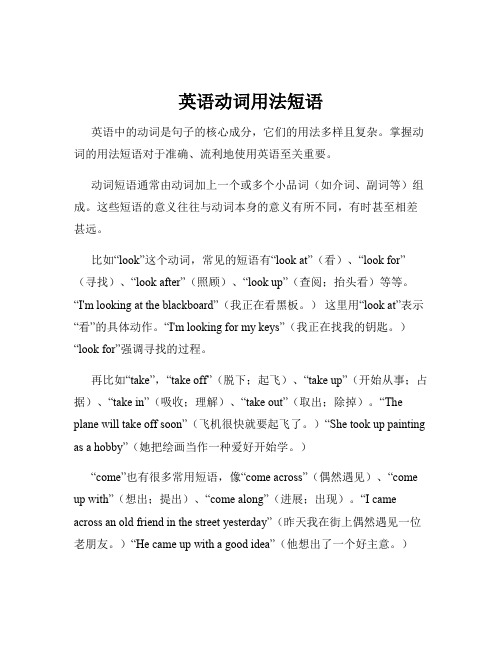
英语动词用法短语英语中的动词是句子的核心成分,它们的用法多样且复杂。
掌握动词的用法短语对于准确、流利地使用英语至关重要。
动词短语通常由动词加上一个或多个小品词(如介词、副词等)组成。
这些短语的意义往往与动词本身的意义有所不同,有时甚至相差甚远。
比如“look”这个动词,常见的短语有“look at”(看)、“look for”(寻找)、“look after”(照顾)、“look up”(查阅;抬头看)等等。
“I'm looking at the blackboard”(我正在看黑板。
)这里用“look at”表示“看”的具体动作。
“I'm looking for my keys”(我正在找我的钥匙。
)“look for”强调寻找的过程。
再比如“take”,“take off”(脱下;起飞)、“take up”(开始从事;占据)、“take in”(吸收;理解)、“take out”(取出;除掉)。
“The plane will take off soon”(飞机很快就要起飞了。
)“She took up painting as a hobby”(她把绘画当作一种爱好开始学。
)“come”也有很多常用短语,像“come across”(偶然遇见)、“come up with”(想出;提出)、“come along”(进展;出现)。
“I came across an old friend in the street yesterday”(昨天我在街上偶然遇见一位老朋友。
)“He came up with a good idea”(他想出了一个好主意。
)“put”的短语有“put on”(穿上;上演)、“put off”(推迟)、“put up”(张贴;搭建)、“put away”(放好;收拾)。
“It's cold Please put on your coat”(天气冷。
- 1、下载文档前请自行甄别文档内容的完整性,平台不提供额外的编辑、内容补充、找答案等附加服务。
- 2、"仅部分预览"的文档,不可在线预览部分如存在完整性等问题,可反馈申请退款(可完整预览的文档不适用该条件!)。
- 3、如文档侵犯您的权益,请联系客服反馈,我们会尽快为您处理(人工客服工作时间:9:00-18:30)。
英语常用短语的用法与练习(17)81. join in 参加;加入;例句:①Will you join me in a walk 你愿意和我一起散步吗②Let us join hands in friendship. 让我们携手共建友谊吧。
③They didn’t have enough time to join in the activity.他们没有足够的时间来参加这个活动。
join短语:join sb. in sth.与某人一起做某事;join up入伍;参军;join up with sb.与某人联合;会合;join hands with sb.与某人拉起手来;合伙;联合;辨析:join in/join/take part in/attendjoin in 参加正在进行着的活动。
如游戏、讨论、辩论、谈话等。
join ①参加某组织或团体,并成为其中一员;②来和某人待在一起。
take part in 参加会议或有组织的群众性活动,并在其中发挥一定的作用。
attend 正式用语,指参加会议、仪式、婚礼、葬礼、上课、上学、听报告等,句子的主语是去听去看,自己不一定起积极作用,相当于be present。
配套练习:(1).用join/join in/take part in/attend的适当形式填空:①I decided to ______ the club to have dance training.②Would you like me _______ to the game③I ________________ a meeting last month.④I will have to _________ his funeral next week.(2).选择题:①---Would you like to ______ us in this topic ---Yes, I’d like.in part in②Every student wants to _______ the class meeting.in part in③My brother _______ the Army for 3 years.joined joined in been in attended④I’d like to invite you to ________ my birthday pa rty.in part in⑤She will _______ an important meeting next month.in part in⑥Why not _____ an English club to practice _____ EnglishA.to join;to speak B.join;speakingC.join;to speak D.to join;speaking82. keep doing sth. 不停地做某事;例句:①When the teacher raised that question, I kept hoping that he would not ask me to answer it. 当老师提出那个问题时,我一直希望他不要让我来回答。
②In spite of the noise outdoors, she kept on reading. 她无视外面的嘈杂声,继续读书。
③His advice kept me from making a serious mistake. 他的忠告使我免于犯下一个严重的错误。
keep短语:keep+ adj. 保持……;keep+ n.+ adj./adv./n. 使(某人/某物)保持某种状态;keep+ sth. 保存某物;keep on doing 反复做……;keep sb. from doing 阻止某人做……;注意:keep/keep on一般都不能与表示短暂性动作、心理状态或结果的动词连用。
如:常不用keep(on)standing/sitting/beginning/leaving 。
配套练习:(1). 完成句子①Will you please _______ (保管这些钥匙) while I am away②This coat will _______ (让你暖和).③She _______ (让我等) for half an hour.④________ (不要乱动) while I photograph you.⑤He _______ (反复问) asking silly questions.⑥His girlfriend didn’t answer the phone, so Tom ____ (一直在想) why.(2). 单项填空:①Keep ______after meals, then you’ll be in good health.A. walkingB. sleepingC. standingD. sitting②I don’t allow ___ a fo ol of yourself by keeping on ___ the same question.A. to make; repeatB. making; repeatingC. to make; to repeatD. making; to repeat③Thank you for keeping me ___ of everything that’s happening. Don’t mention it.A. informB. informedC. informingD. information④My father always keeps me ___ while he himself keeps ___.A. smoking; smokingB. to smoke; to smokeC. from smoking; smokingD. from smoking; on smoking83. keep it up保持优秀成绩;继续干下去;例句:①Well done,and keep it up,Tom! 干得好,汤姆,再接再厉!②Keep it up! Final victory is in sight. 坚持下去! 最后胜利已经在望了.③There are fears that he will not be able to keep it up when he gets to the particularly demanding third year. 有人担心他到了要求极其严格的第3年时会坚持不下去。
keep短语:keep one’s head/temper保持冷静/强压怒火;keep a school/family/diary 开办学校/养家糊口/写日记;keep one’s word/keep one’s promise履行诺言;keep the law 守法;keep in touch with与……保持联系;keep an eye on ...照看;密切注视;keep up with跟上;保持同步水平不落后;keep away from (常与from连用)远离;不接触;keep to sth.信守;坚持;坚守;不违背(诺言、计划等);keep ...from(doing)sth.避开;禁止;克制;keep out 不让……进入; keep up 保持;配套练习:(1). 完成句子①We appeal to the government to _______ (降低) prices.②The police asked the people to ______ / ______ (远离) the scene of the accident.③Though things changed,they _______ (坚持;信守) the original purpose.④We asked her to stop talking,but she _______ (继续干下去).⑤He stopped at a shop for something,so he failed _______ (跟上) his associates and was left behind.⑥把你的狗从我这儿拿开! Keep _________ !⑦他总是说话算数的。
He always keeps _______ / _______ .⑧他对他的结论守口如瓶。
He kept ________ .(2). 单项填空:①—The windows are broken and need repairing.—I think so. They can hardly _____ the cold now.A. keep outB. give outC. take outD. put out②We read the newspaper every day to ______the present affairs.A. keep upB. keep up withC. catch up withD. keep in touch with③In face of failure for the moment ,it’s the most important to_____a good state of mind.A. keep onB. keep atC. keep upD. keep out④— I get at least half an hour of exercise almost every day.— Oh great! .A. Good luckB. Cheer upC. Same to youD. Keep it up84. lead to通向;导致;造成(后果);注意:lead to中的to为介词,该短语后可跟名词或动名词。
例句:①The car accident led to his being killed. 那次车祸导致他死亡。
②All roads lead to Rome. 条条大路通罗马。
③Eating too much sugar can lead to health problems. 吃太多糖会导致健康问题。
④His carelessness led to his failure. 他的粗心导致了他的失败。
lead短语:lead sb to do sth使某人做某事;in the lead = be ahead of 首位、最先;lead off (vi) 开始;lead into 引入、通向(可进入内部);lead somebody (in) doing something 领导某人做某事;result in导致;result from由……导致;配套练习:单项填空:①The students in the university are all taking courses _____a degree.A. sticking toB. leading toC. turning toD. referring to②In the countryside there are many dropouts (辍学者). I think the difficulty____ the poor economic conditions.A. lies inB. result inC. leads toD. suffers from③The famous scientist began the research which _____ his new discoveries.A. belonged toB. led toC. caused toD. brought to④The hotel was very different from what the advertisement_____ us to expect. We found that its conditions were terrible.A. madeB. shownC. ledD. told⑤The narrow passage _______ the big mountain for one mile.A. passes throughB. leads toC. leads on toD. reach85. leave ...alone丢下不管,不理会,不干涉, 不打扰;例句:①Leave me alone. 不要管我的事。
